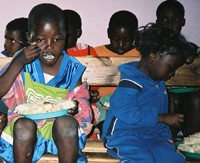UNICEF Raises The Problem of Scanty Nutrition For Children in Africa
Around 200 million kids in poor countries have stunted growth because they don't get enough food, according to a new report published Wednesday by UNICEF.

The vast majority are in Asia and Africa: more than 90 % of children with stunted growth live on those two continents.
"Unless attention is paid to addressing the causes of child and maternal undernutrition today, the costs will be considerably higher tomorrow," said UNICEF executive director Ann M. Veneman in a statement. More than a third of all deaths in children under five are linked to undernutrition, according to UNICEF. Children with nutritional deficiencies often lack the strength to fight off diseases and complications.
But little money has gone into ensuring kids in the developing world get enough food, compared to high-profile problems like AIDS. Though AIDS causes about 2 % of all child deaths, it gets more than 20 cents of every dollar spent on public health.
UNICEF was unable to say how much it spends on nutrition. But last year, its sister agency, the World Health Organization, spent about six times as much on AIDS in Africa as it did on nutrition.
Whereas progress has been made in Asia — rates of stunted growth dropped from 44 % in 1990 to 30 % last year — there has been little success in Africa. There, the rate of stunted growth was about 38 % in 1990. Last year, the rate was about 34 %.
The U.N. children's agency called for more strategies like vitamin A supplementation and breast-feeding to be rolled out more widely. That could cut the death rate in kids by up to 15 %.
Not everyone agreed. "It is unrealistic to believe malnutrition can be addressed by any top-down U.N. scheme," said Philip Stevens, of International Policy Network, a London-based think tank. "The progress UNICEF's report points to in improving nutrition is almost certainly a result of economic growth, not U.N. strategies."
Some previous U.N. child health interventions that included similar plans have been disappointing. A study published in July found that one of the U.N.'s main child health efforts had surprisingly little effect in saving children's lives in Bangladesh.
The Associated Press has contributed to the report.
Subscribe to Pravda.Ru Telegram channel, Facebook, RSS!




